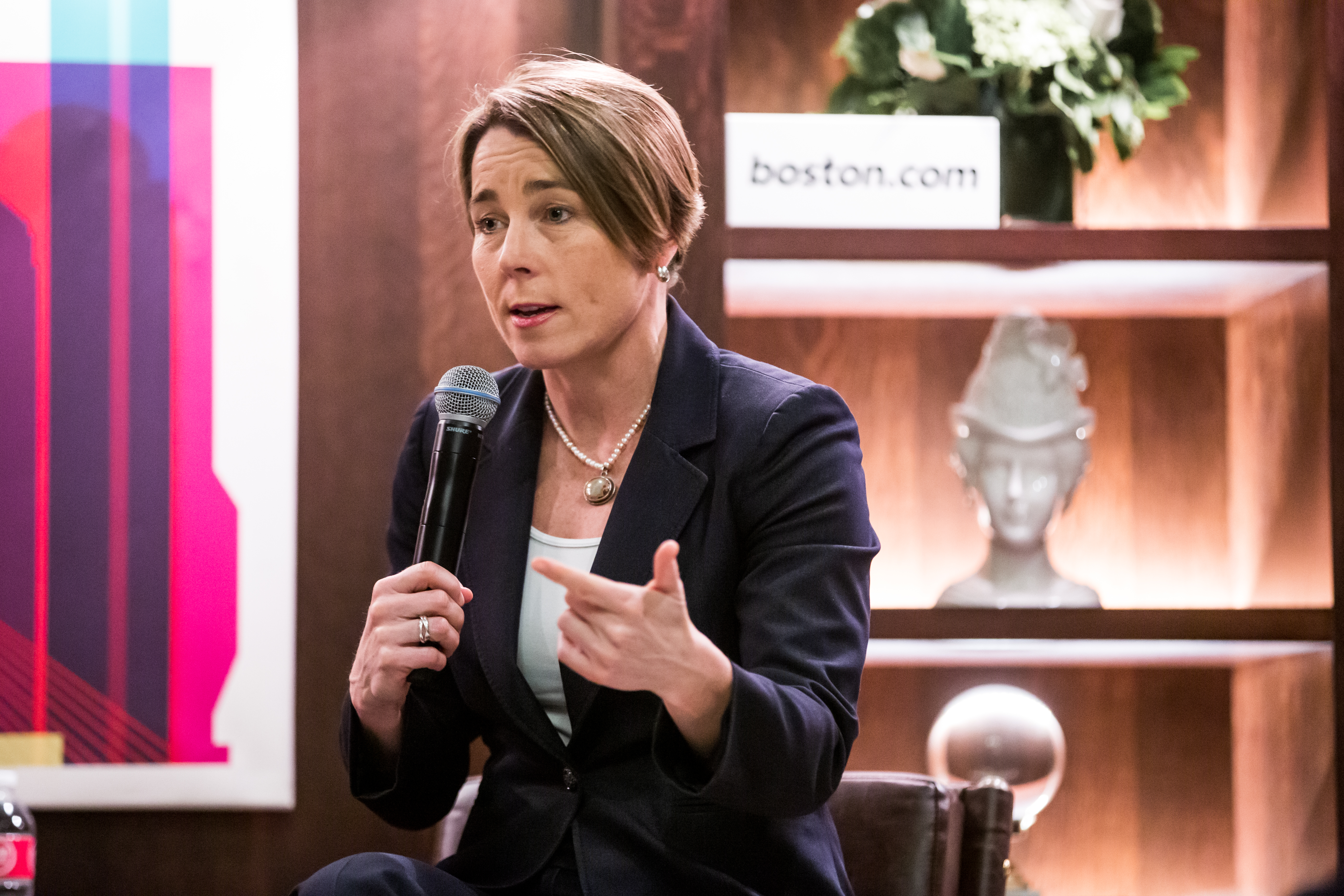At the most recent HUBweek Curated Conversation, Massachusetts Attorney General Maura Healey sat down with the Boston Globe’s managing director Linda Henry for an intimate conversation about her path to the AG’s office, being “the people’s lawyer,” and her role in creating a more equitable, forward-looking Commonwealth.
As the AG, Healey is at the center of major questions facing the state — and the nation — today, from managing the opioid crisis and curbing gun violence to instituting criminal justice reforms and protecting civil rights. During the lunch, she shared her insights on these issues — and how her office is working to address them. Read on below for highlights from the conversation, and to hear Healey’s take on the biggest issues.

Gun Control
Healey’s main message on the gun violence epidemic: “We don’t need to live like this.” With 300 people killed or injured by guns every day, she views gun violence as a public health crisis, not just a matter of public safety. “I think more and more people are reaching the understanding that respecting the Second Amendment and having laws on the books that address public health are not mutually exclusive prerogatives,” she explained. To that end, her office began by enforcing existing Massachusetts state laws, as well as advocating for nationwide reforms and instituting school programs to address the root causes of gun violence among youth. How can we keep the momentum going? “We need to continue to demand accountability and put people in office who will bring...sense” to these issues.
Opioid Crisis
The opioid epidemic continues to impact millions of individuals, families, and communities across Massachusetts, and Healey’s office has been hot on the trail of the drug manufacturers and distributors who have fueled the crisis. “The story needs to be told here, there needs to be accountability, and a light needs to be shed on what got us into this devastating mess so that it never happens again,” Healey told the audience. Even after Purdue Pharma, the maker of the painkiller OxyContin, paid a $600 million fine following a lawsuit in 2007, Healey noticed that the company continued to make sales visits — more than 150,000 — to Massachusetts. She’s since filed a new lawsuit against the company and its executives, hoping to stem the flow of opioids into the state. And her response to Purdue’s recent $270 million settlement in Oklahoma: “Having spent enough time with victims and families, that doesn’t cut it.”
Criminal Justice Reform
One of Healey’s proudest accomplishments were “much-needed” reforms to the state’s criminal justice system. She and her office worked on the criminal justice reform bill passed by the state legislature and signed by Governor Baker last year; the law ensures that the court and penal justice systems are more efficient, concentrating resources on serious and violent crimes. Healey explained, “I had a really vested interest in making sure the criminal justice system here in Massachusetts is fair, addresses real racial disparities that exist, disparities that also exist along socioeconomic, and ultimately make a system that is more effective for public safety.”

Diversity and Inclusion
Boston is considered one of the most racist cities in America, so when Healey took office, she knew she had an opportunity to make diversity and inclusion a priority. One of her first actions as AG was to conduct a mandatory training on unconscious and implicit biases for the entire office, including the state police. These kinds of training programs help people address and understand their unconscious biases while providing methods to eliminate discriminatory behaviors. The experience was “challenging, and hard, but really, really good.” Her endeavors haven’t stopped there either: “We’ve continued with efforts around diversity and inclusion, including completely revamping how we do our hiring and how we should engage with the workforce.”
Gender and Racial Diversity
Did you know that the majority of Healey’s management team, including the state solicitor, chief deputy, and first assistant, as well as a majority of bureau chiefs, attorneys, and employees are women? This sharply contrasts with nationwide statistics of women in government positions: According to the Center for American Women and Politics (CAWP), women hold just 20.6% of the 535 seats in the 114th US Congress, 23.7% of the 312 available statewide elective executive offices, and 25.4% of the 7,383 state legislator positions. Healey is also “really proud of the number of people of color [they have] been able to bring into the ranks.” With her Advisory Council on Racial Justice and Equity, Healey works to address issues concerning racial justice, racial disparities, and barriers for communities of color around the state.
Human Trafficking
If Attorney General Healey had one message on human trafficking, it was that increasing awareness and education is key. With recent events drawing more attention to trafficking victims and perpetrators, Healey said that now is the time to stop what she characterized as the fastest growing criminal enterprise in the world. “It’s about prosecuting these cases, but it’s also about raising awareness and education that this is not a victimless crime,” she told the audience. She went on to explain that victims of human trafficking are often society’s most vulnerable: victims of domestic violence or other abuse, individuals who are drug or alcohol addicted, or those who struggle with mental health issues. Due to increased public attention to these issues, Healey sees “an opportunity to help and hopefully change the culture and the understanding of what this is really about.”
